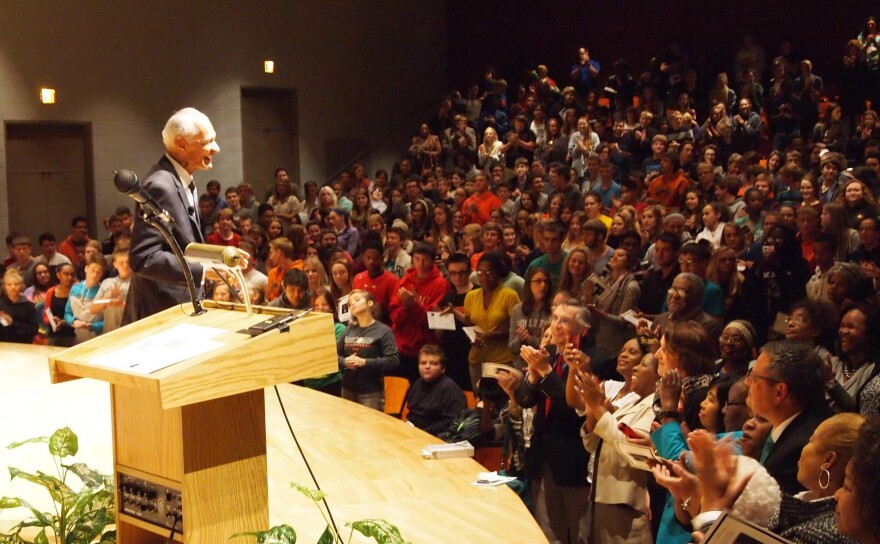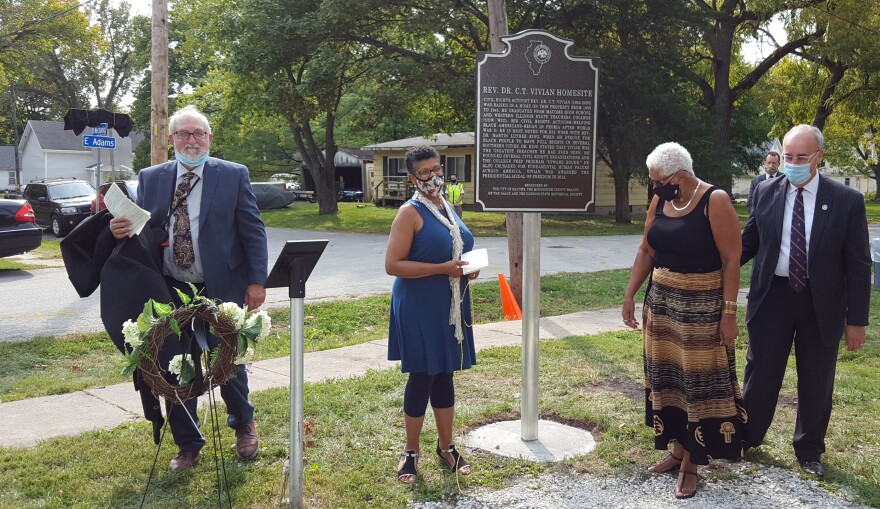Illinois has designated the location of the Reverend C.T. Vivian's childhood home in Macomb as an Illinois State Historical Site. The city and state unveiled the marker during a ceremony that more than 100 people attended.
C.T. Vivian’s family moved to Macomb when he was a young child. He attended Macomb schools and Western Illinois University before leaving the community in the late 1940s. He went on to serve as one of the leading figures of the American Civil Rights movement of the 1950s and ‘60s.
In 2013, President Barack Obama awarded Dr. Vivian the Presidential Medal of Freedom, which is the nation’s highest civilian honor.
Vivian died July 17, 2020 at his home in Atlanta, Georgia. He was 95.
Byron Oden-Shabazz, President of the McDonough County Branch of the NAACP, said he plans to seek a national historic designation for the Macomb site. Oden-Shabazz would also like to build a center of civic and social engagement as well as a small park at the site on East Adams Street. The lot is currently vacant.
Excerpts from some of the ceremony’s speakers:

Jo Anna Walker, one of Dr. Vivian’s daughters: He loved this city. Daddy loved Macomb.
Daddy said even the negative things that happened to him in Macomb taught him to understand that there are good people regardless of color. There are good people, Black and white. His words were he would have gladly stayed here in Macomb but due to racism and other events he had to leave to be accepted for his true humanity. And he also said that he thinks Macomb and he lost.
Dr. Martin Abraham, Interim President of Western Illinois University: At Western we have the responsibility and quite frankly the pleasure of preparing the next generation of young Black leaders - some tremendous students and tremendous individuals who are still fighting Dr. Vivian’s fight. They’re fighting for justice here in our community.
We had several hundred students earlier this month in the spirit of Dr. Vivian organize a protest rally. They marched from the center of our university to Chandler Park, demanding change, still demanding change. I listened to our students as they relayed their stories and I recognized that 75 years after Dr. Vivian started the protests, that our students are still looking for change, still looking for opportunities to fight the anti-Black racism that we have and that still pervades our community and our country.
It is fitting to give testimony to the great work that Dr. Vivian did through our words. But let’s truly honor his legacy by coming together to make real change in our community. We have a lot of work to do.

Dr. Earl Bracey, Associate Vice President of Student Services Emeritus, Western Illinois University: It’s not a Black thing. It’s a people thing. It’s about all of us standing up for what’s right, and in the face of any injustice calling it out for what it is. Sometimes people with power get a little intoxicated with what they deem to be their strength, which is pretty evident right now with the current occupant of the White House.
We’re talking about a love of humanity. That’s what we’re celebrating today – a man who spent his life pushing that envelope.
We need each other. That’s what a community is about: coming together. We’re all one big family and we’re celebrating such.
William Furry: Executive Director, Illinois State Historical Society: We have a lot of work to do, but the State Historical Society is eager to get on with that work. We have a program out right now looking for nominations for new historical markers for the African American experience in Illinois. If you have a suggestion for us, I’d love to hear about it.
This historical marker is the fastest one I’ve ever seen come around. I have one right now that‘s been in the works for two years. This one took about eight weeks. It went like that thanks to you, thanks to your generosity, your support, finding the right location, finding a support group. It’s wonderful to see you here, social distancing and celebrating the life of a great American.
Mayor Mike Inman: Dr. Vivian came to Macomb as a small boy with his grandmother. He spent formative years here growing up, being nurtured, gaining wisdom, right here on this very spot with his grandmother.
He probably walked the several blocks from this house, with his grandmother, to Lincoln School, then to Macomb High School and to Western Illinois University, all right from this place, influenced by his grandmother.
I would like to pause for just a moment and think about the probability of the significant role his grandmother – a nurturing, strong, wise Black woman – had on his formative years. As we reflect on the profound impact Dr. Vivian had on the American Civil Rights movement, his faith ministry, on social and racial issues not only in the United States but around the world, think again about the likely influence his grandmother had in forming this young man during those years here in Macomb.
And now I would like you to think about the strong, nurturing, wise Black women that are in this community today, forming the lives of young Black boys and girls, young men and women: Helen Thorpe, Essie Rutledge, Andrea Henderson, Debbie Huston, Verneata Jones, Belinda Carr, Loretta Oden, and Sondra Mosley just to name a few, all helping form future Dr. C.T. Vivians, young people going forth with the potential to change the world.
Belinda Carr, Director Emerita, Gwendolyn Brooks Cultural Center at Western Illinois University: Given that Dr. Vivian stood for equity and justice, I would be remiss if I didn’t remind you of two events. One is the census. If you have not completed your census, do so. Every voice counts. We need that count, not only in Macomb but everywhere.
Also, early voting started September 24. Take advantage of the options to let your voice be heard whether you do an absentee ballot, whether you take your ballot and drop it in the box outside the courthouse, or go in the courthouse and vote, or cast your vote on November 3. It’s your right. Take advantage of it.
Dr. John Hallwas, Distinguished Professor Emeritus, Western Illinois University: This is truly a significant occasion for our town as we dedicate the state historical marker honoring the most noted resident in Macomb’s history and a truly eminent Illinoisian.
As Dr. Vivian’s career in civil rights leadership continued long after 1970, he also broadened his focus, realizing that what he and other Black leaders had done decades ago was relevant for the many ethnic relationship problems and human concerns that we face today.
We need to work together so that our state and our nation become more aware – not just of C.T. Vivian’s harsh experiences as a civil rights crusader, which you see in every article about him, and his inspiring leadership, but his social insights and his deep commitment to all of humanity.

Honorary Street Name
Also as part of the ceremony, the city added the honorary designation of Dr. C.T. Vivian Way to the section of East Adams Street from Edwards Street to Pearl Street. It’s the third street in Macomb to receive the designation in honor of Vivian.
The other two streets are the stretch of North Lafayette Street from University Drive to the downtown area, and the stretch of West Murray Street that runs through the Western Illinois University campus.
In addition, the library at Macomb Junior-Senior High School is named in honor of Dr. Vivian.
This story was produced by Tri States Public Radio. TSPR relies on financial support from our readers and listeners in order to provide coverage of the issues that matter to west central Illinois, southeast Iowa, and northeast Missouri. As someone who values the content created by TSPR's news department please consider making a financial contribution.







